A Sociological Exploration of Emerging Adulthood and Social Change
VerifiedAdded on 2023/06/18
|11
|3768
|459
Essay
AI Summary
This essay provides a sociological analysis of emerging adulthood, a developmental stage between adolescence and young adulthood, typically spanning ages 18 to 29. It discusses the key characteristics of this period, including identity exploration, instability, self-focus, feeling in-between, and a sense of possibilities. The essay explores how social and technological changes have influenced the emergence of this distinct life stage, leading to delayed entry into traditional adult roles such as marriage and stable employment. It also examines the impact of emerging adulthood on social change, highlighting the importance of individual development, mental health, and the challenges and opportunities that arise during this transitional phase. The essay emphasizes the need for support and resources to help emerging adults successfully navigate the complexities of this stage and achieve positive developmental outcomes. Desklib offers a range of study tools and resources to support students in understanding complex sociological concepts.
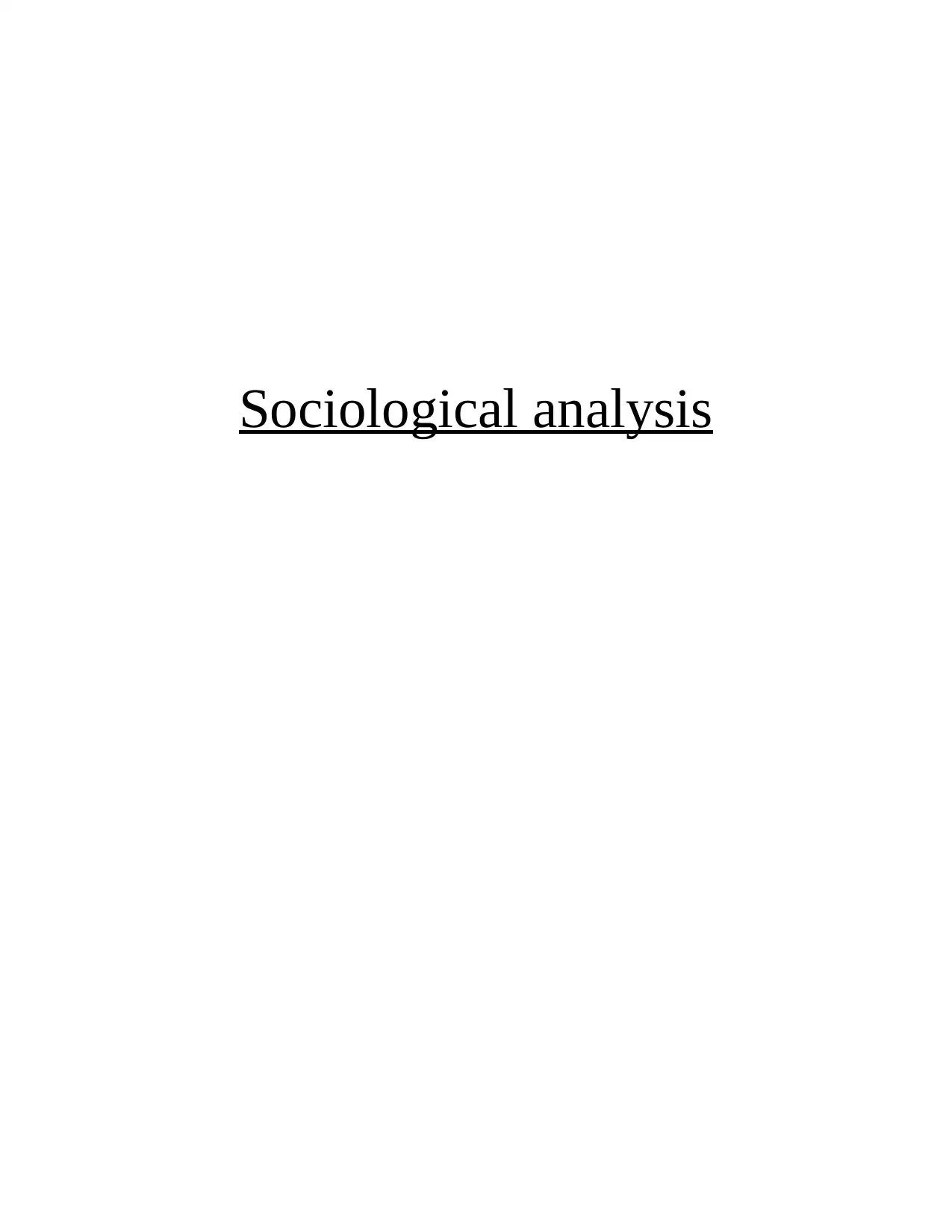
Sociological analysis
Paraphrase This Document
Need a fresh take? Get an instant paraphrase of this document with our AI Paraphraser
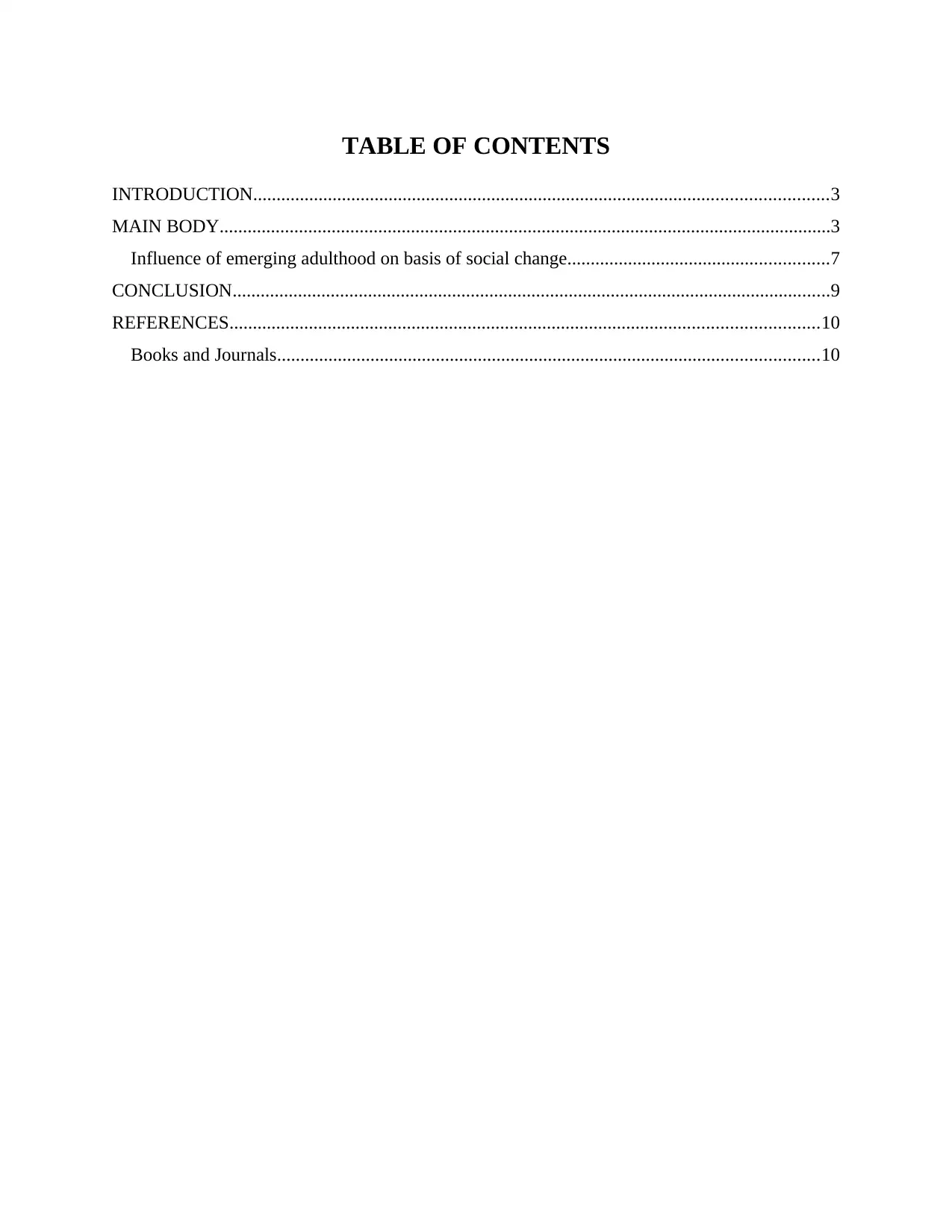
TABLE OF CONTENTS
INTRODUCTION...........................................................................................................................3
MAIN BODY...................................................................................................................................3
Influence of emerging adulthood on basis of social change........................................................7
CONCLUSION................................................................................................................................9
REFERENCES..............................................................................................................................10
Books and Journals....................................................................................................................10
INTRODUCTION...........................................................................................................................3
MAIN BODY...................................................................................................................................3
Influence of emerging adulthood on basis of social change........................................................7
CONCLUSION................................................................................................................................9
REFERENCES..............................................................................................................................10
Books and Journals....................................................................................................................10
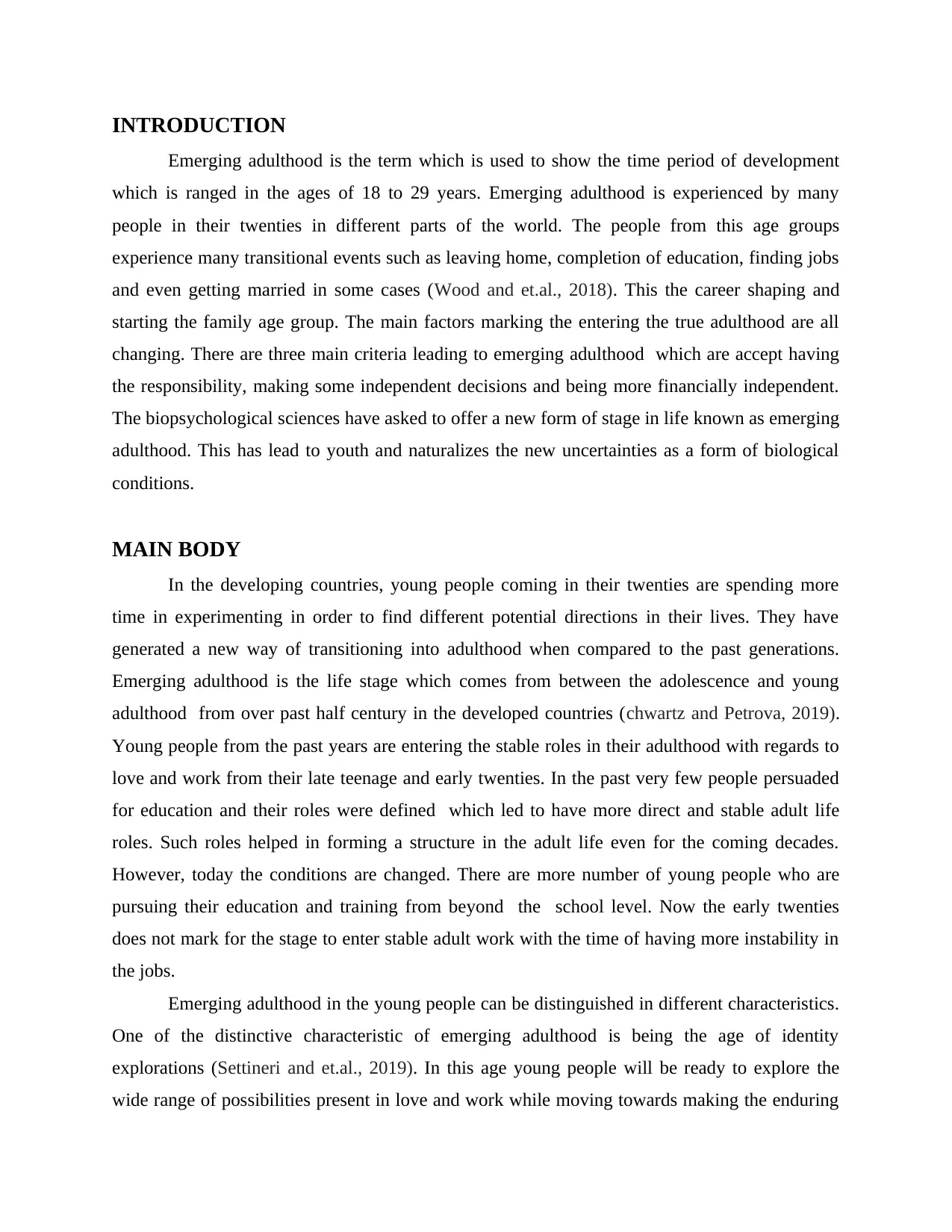
INTRODUCTION
Emerging adulthood is the term which is used to show the time period of development
which is ranged in the ages of 18 to 29 years. Emerging adulthood is experienced by many
people in their twenties in different parts of the world. The people from this age groups
experience many transitional events such as leaving home, completion of education, finding jobs
and even getting married in some cases (Wood and et.al., 2018). This the career shaping and
starting the family age group. The main factors marking the entering the true adulthood are all
changing. There are three main criteria leading to emerging adulthood which are accept having
the responsibility, making some independent decisions and being more financially independent.
The biopsychological sciences have asked to offer a new form of stage in life known as emerging
adulthood. This has lead to youth and naturalizes the new uncertainties as a form of biological
conditions.
MAIN BODY
In the developing countries, young people coming in their twenties are spending more
time in experimenting in order to find different potential directions in their lives. They have
generated a new way of transitioning into adulthood when compared to the past generations.
Emerging adulthood is the life stage which comes from between the adolescence and young
adulthood from over past half century in the developed countries (chwartz and Petrova, 2019).
Young people from the past years are entering the stable roles in their adulthood with regards to
love and work from their late teenage and early twenties. In the past very few people persuaded
for education and their roles were defined which led to have more direct and stable adult life
roles. Such roles helped in forming a structure in the adult life even for the coming decades.
However, today the conditions are changed. There are more number of young people who are
pursuing their education and training from beyond the school level. Now the early twenties
does not mark for the stage to enter stable adult work with the time of having more instability in
the jobs.
Emerging adulthood in the young people can be distinguished in different characteristics.
One of the distinctive characteristic of emerging adulthood is being the age of identity
explorations (Settineri and et.al., 2019). In this age young people will be ready to explore the
wide range of possibilities present in love and work while moving towards making the enduring
Emerging adulthood is the term which is used to show the time period of development
which is ranged in the ages of 18 to 29 years. Emerging adulthood is experienced by many
people in their twenties in different parts of the world. The people from this age groups
experience many transitional events such as leaving home, completion of education, finding jobs
and even getting married in some cases (Wood and et.al., 2018). This the career shaping and
starting the family age group. The main factors marking the entering the true adulthood are all
changing. There are three main criteria leading to emerging adulthood which are accept having
the responsibility, making some independent decisions and being more financially independent.
The biopsychological sciences have asked to offer a new form of stage in life known as emerging
adulthood. This has lead to youth and naturalizes the new uncertainties as a form of biological
conditions.
MAIN BODY
In the developing countries, young people coming in their twenties are spending more
time in experimenting in order to find different potential directions in their lives. They have
generated a new way of transitioning into adulthood when compared to the past generations.
Emerging adulthood is the life stage which comes from between the adolescence and young
adulthood from over past half century in the developed countries (chwartz and Petrova, 2019).
Young people from the past years are entering the stable roles in their adulthood with regards to
love and work from their late teenage and early twenties. In the past very few people persuaded
for education and their roles were defined which led to have more direct and stable adult life
roles. Such roles helped in forming a structure in the adult life even for the coming decades.
However, today the conditions are changed. There are more number of young people who are
pursuing their education and training from beyond the school level. Now the early twenties
does not mark for the stage to enter stable adult work with the time of having more instability in
the jobs.
Emerging adulthood in the young people can be distinguished in different characteristics.
One of the distinctive characteristic of emerging adulthood is being the age of identity
explorations (Settineri and et.al., 2019). In this age young people will be ready to explore the
wide range of possibilities present in love and work while moving towards making the enduring
⊘ This is a preview!⊘
Do you want full access?
Subscribe today to unlock all pages.

Trusted by 1+ million students worldwide
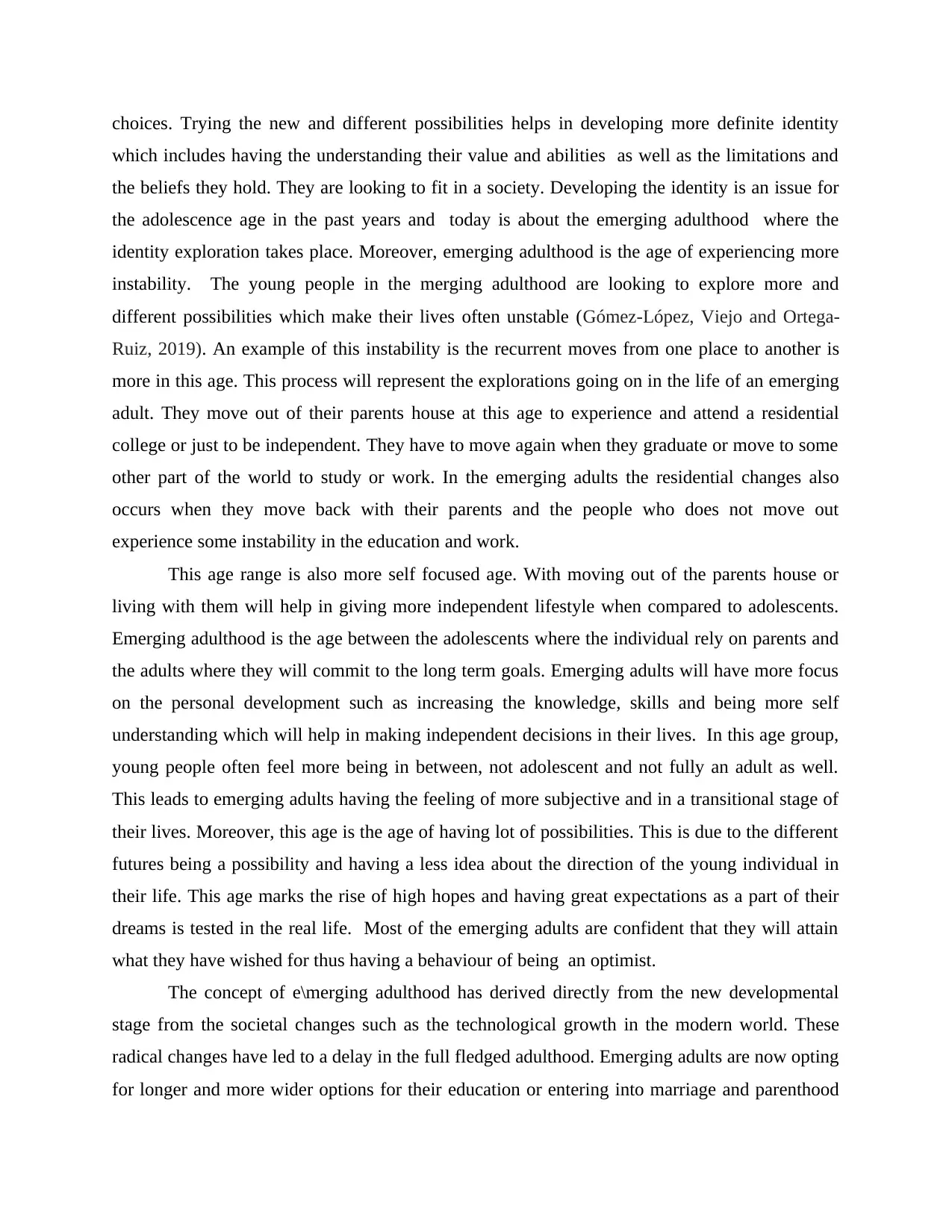
choices. Trying the new and different possibilities helps in developing more definite identity
which includes having the understanding their value and abilities as well as the limitations and
the beliefs they hold. They are looking to fit in a society. Developing the identity is an issue for
the adolescence age in the past years and today is about the emerging adulthood where the
identity exploration takes place. Moreover, emerging adulthood is the age of experiencing more
instability. The young people in the merging adulthood are looking to explore more and
different possibilities which make their lives often unstable (Gómez-López, Viejo and Ortega-
Ruiz, 2019). An example of this instability is the recurrent moves from one place to another is
more in this age. This process will represent the explorations going on in the life of an emerging
adult. They move out of their parents house at this age to experience and attend a residential
college or just to be independent. They have to move again when they graduate or move to some
other part of the world to study or work. In the emerging adults the residential changes also
occurs when they move back with their parents and the people who does not move out
experience some instability in the education and work.
This age range is also more self focused age. With moving out of the parents house or
living with them will help in giving more independent lifestyle when compared to adolescents.
Emerging adulthood is the age between the adolescents where the individual rely on parents and
the adults where they will commit to the long term goals. Emerging adults will have more focus
on the personal development such as increasing the knowledge, skills and being more self
understanding which will help in making independent decisions in their lives. In this age group,
young people often feel more being in between, not adolescent and not fully an adult as well.
This leads to emerging adults having the feeling of more subjective and in a transitional stage of
their lives. Moreover, this age is the age of having lot of possibilities. This is due to the different
futures being a possibility and having a less idea about the direction of the young individual in
their life. This age marks the rise of high hopes and having great expectations as a part of their
dreams is tested in the real life. Most of the emerging adults are confident that they will attain
what they have wished for thus having a behaviour of being an optimist.
The concept of e\merging adulthood has derived directly from the new developmental
stage from the societal changes such as the technological growth in the modern world. These
radical changes have led to a delay in the full fledged adulthood. Emerging adults are now opting
for longer and more wider options for their education or entering into marriage and parenthood
which includes having the understanding their value and abilities as well as the limitations and
the beliefs they hold. They are looking to fit in a society. Developing the identity is an issue for
the adolescence age in the past years and today is about the emerging adulthood where the
identity exploration takes place. Moreover, emerging adulthood is the age of experiencing more
instability. The young people in the merging adulthood are looking to explore more and
different possibilities which make their lives often unstable (Gómez-López, Viejo and Ortega-
Ruiz, 2019). An example of this instability is the recurrent moves from one place to another is
more in this age. This process will represent the explorations going on in the life of an emerging
adult. They move out of their parents house at this age to experience and attend a residential
college or just to be independent. They have to move again when they graduate or move to some
other part of the world to study or work. In the emerging adults the residential changes also
occurs when they move back with their parents and the people who does not move out
experience some instability in the education and work.
This age range is also more self focused age. With moving out of the parents house or
living with them will help in giving more independent lifestyle when compared to adolescents.
Emerging adulthood is the age between the adolescents where the individual rely on parents and
the adults where they will commit to the long term goals. Emerging adults will have more focus
on the personal development such as increasing the knowledge, skills and being more self
understanding which will help in making independent decisions in their lives. In this age group,
young people often feel more being in between, not adolescent and not fully an adult as well.
This leads to emerging adults having the feeling of more subjective and in a transitional stage of
their lives. Moreover, this age is the age of having lot of possibilities. This is due to the different
futures being a possibility and having a less idea about the direction of the young individual in
their life. This age marks the rise of high hopes and having great expectations as a part of their
dreams is tested in the real life. Most of the emerging adults are confident that they will attain
what they have wished for thus having a behaviour of being an optimist.
The concept of e\merging adulthood has derived directly from the new developmental
stage from the societal changes such as the technological growth in the modern world. These
radical changes have led to a delay in the full fledged adulthood. Emerging adults are now opting
for longer and more wider options for their education or entering into marriage and parenthood
Paraphrase This Document
Need a fresh take? Get an instant paraphrase of this document with our AI Paraphraser
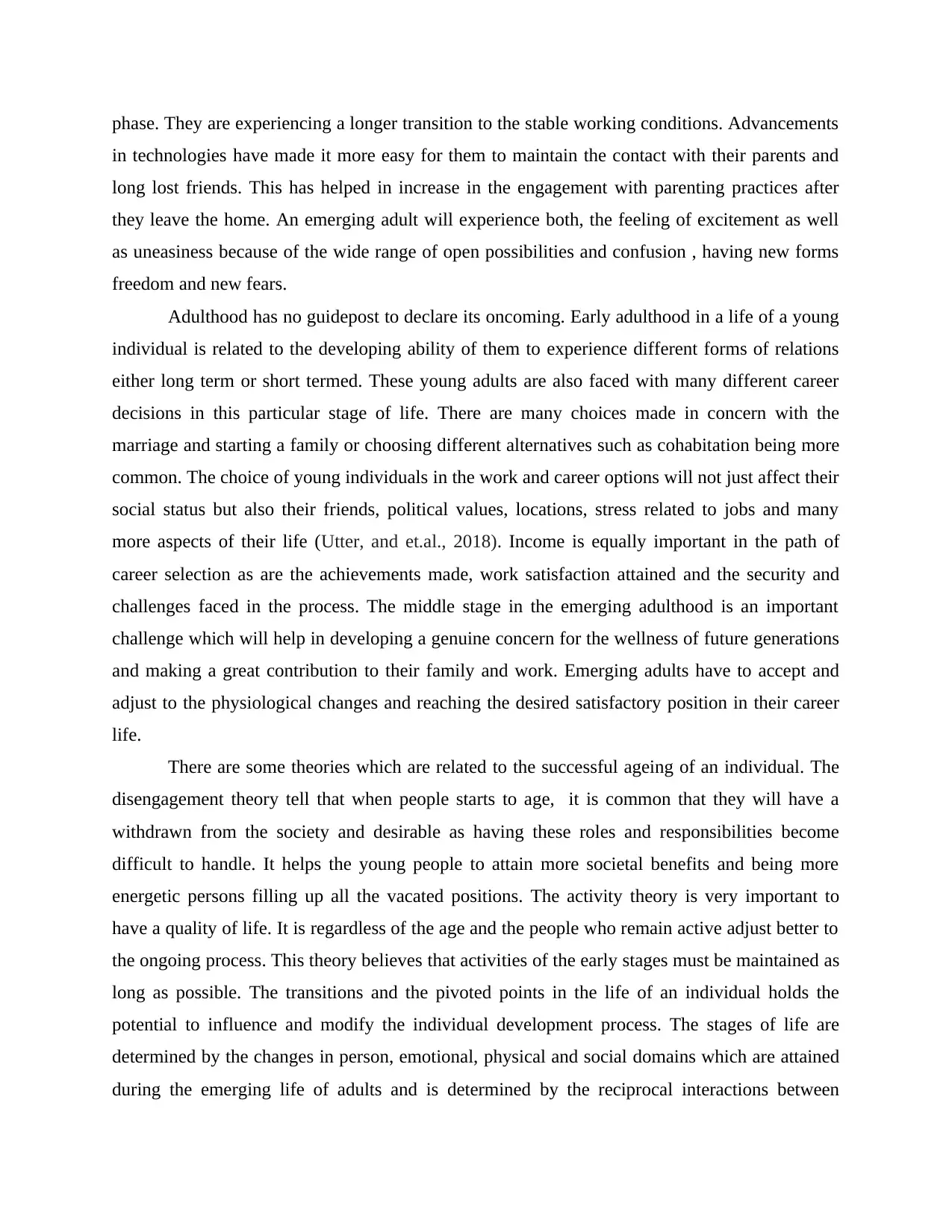
phase. They are experiencing a longer transition to the stable working conditions. Advancements
in technologies have made it more easy for them to maintain the contact with their parents and
long lost friends. This has helped in increase in the engagement with parenting practices after
they leave the home. An emerging adult will experience both, the feeling of excitement as well
as uneasiness because of the wide range of open possibilities and confusion , having new forms
freedom and new fears.
Adulthood has no guidepost to declare its oncoming. Early adulthood in a life of a young
individual is related to the developing ability of them to experience different forms of relations
either long term or short termed. These young adults are also faced with many different career
decisions in this particular stage of life. There are many choices made in concern with the
marriage and starting a family or choosing different alternatives such as cohabitation being more
common. The choice of young individuals in the work and career options will not just affect their
social status but also their friends, political values, locations, stress related to jobs and many
more aspects of their life (Utter, and et.al., 2018). Income is equally important in the path of
career selection as are the achievements made, work satisfaction attained and the security and
challenges faced in the process. The middle stage in the emerging adulthood is an important
challenge which will help in developing a genuine concern for the wellness of future generations
and making a great contribution to their family and work. Emerging adults have to accept and
adjust to the physiological changes and reaching the desired satisfactory position in their career
life.
There are some theories which are related to the successful ageing of an individual. The
disengagement theory tell that when people starts to age, it is common that they will have a
withdrawn from the society and desirable as having these roles and responsibilities become
difficult to handle. It helps the young people to attain more societal benefits and being more
energetic persons filling up all the vacated positions. The activity theory is very important to
have a quality of life. It is regardless of the age and the people who remain active adjust better to
the ongoing process. This theory believes that activities of the early stages must be maintained as
long as possible. The transitions and the pivoted points in the life of an individual holds the
potential to influence and modify the individual development process. The stages of life are
determined by the changes in person, emotional, physical and social domains which are attained
during the emerging life of adults and is determined by the reciprocal interactions between
in technologies have made it more easy for them to maintain the contact with their parents and
long lost friends. This has helped in increase in the engagement with parenting practices after
they leave the home. An emerging adult will experience both, the feeling of excitement as well
as uneasiness because of the wide range of open possibilities and confusion , having new forms
freedom and new fears.
Adulthood has no guidepost to declare its oncoming. Early adulthood in a life of a young
individual is related to the developing ability of them to experience different forms of relations
either long term or short termed. These young adults are also faced with many different career
decisions in this particular stage of life. There are many choices made in concern with the
marriage and starting a family or choosing different alternatives such as cohabitation being more
common. The choice of young individuals in the work and career options will not just affect their
social status but also their friends, political values, locations, stress related to jobs and many
more aspects of their life (Utter, and et.al., 2018). Income is equally important in the path of
career selection as are the achievements made, work satisfaction attained and the security and
challenges faced in the process. The middle stage in the emerging adulthood is an important
challenge which will help in developing a genuine concern for the wellness of future generations
and making a great contribution to their family and work. Emerging adults have to accept and
adjust to the physiological changes and reaching the desired satisfactory position in their career
life.
There are some theories which are related to the successful ageing of an individual. The
disengagement theory tell that when people starts to age, it is common that they will have a
withdrawn from the society and desirable as having these roles and responsibilities become
difficult to handle. It helps the young people to attain more societal benefits and being more
energetic persons filling up all the vacated positions. The activity theory is very important to
have a quality of life. It is regardless of the age and the people who remain active adjust better to
the ongoing process. This theory believes that activities of the early stages must be maintained as
long as possible. The transitions and the pivoted points in the life of an individual holds the
potential to influence and modify the individual development process. The stages of life are
determined by the changes in person, emotional, physical and social domains which are attained
during the emerging life of adults and is determined by the reciprocal interactions between
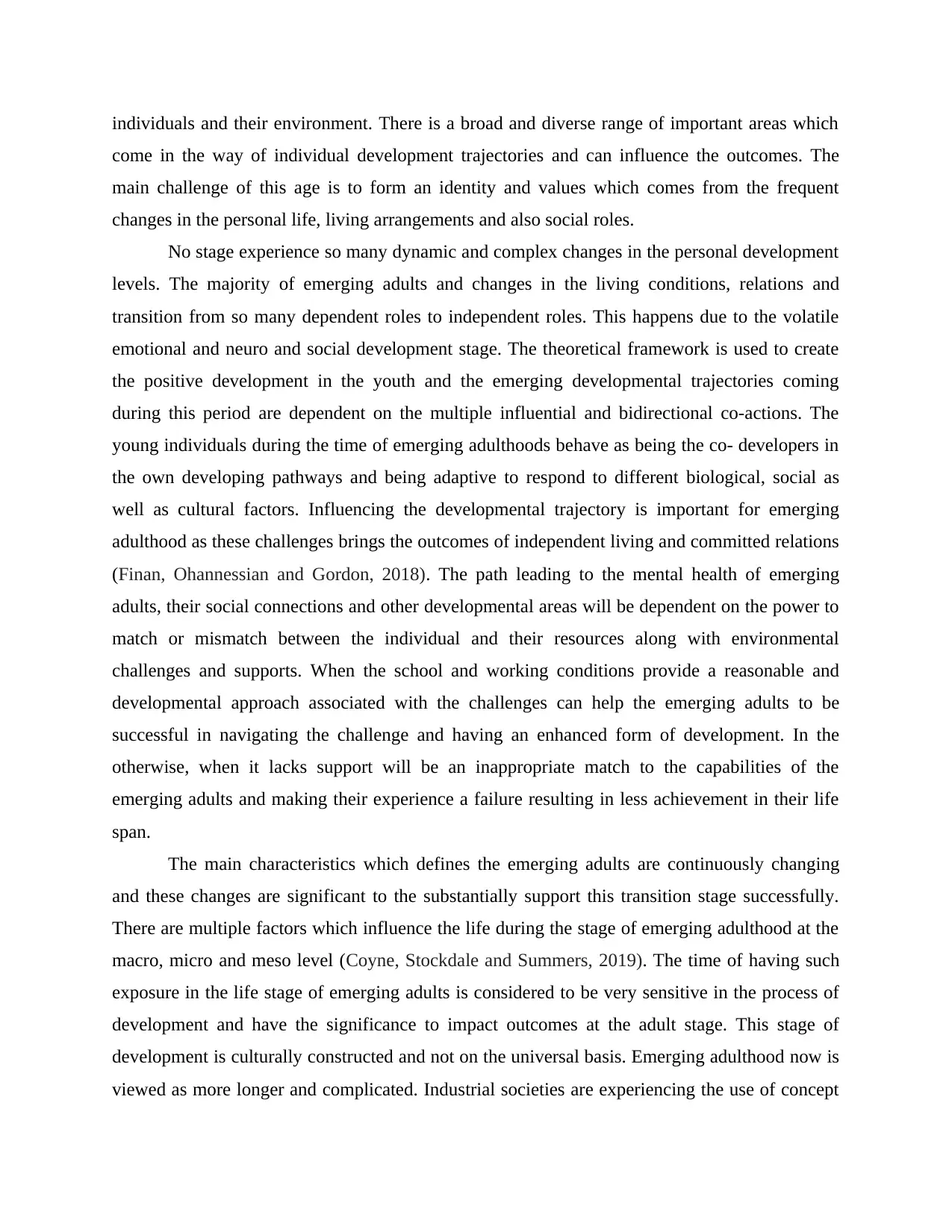
individuals and their environment. There is a broad and diverse range of important areas which
come in the way of individual development trajectories and can influence the outcomes. The
main challenge of this age is to form an identity and values which comes from the frequent
changes in the personal life, living arrangements and also social roles.
No stage experience so many dynamic and complex changes in the personal development
levels. The majority of emerging adults and changes in the living conditions, relations and
transition from so many dependent roles to independent roles. This happens due to the volatile
emotional and neuro and social development stage. The theoretical framework is used to create
the positive development in the youth and the emerging developmental trajectories coming
during this period are dependent on the multiple influential and bidirectional co-actions. The
young individuals during the time of emerging adulthoods behave as being the co- developers in
the own developing pathways and being adaptive to respond to different biological, social as
well as cultural factors. Influencing the developmental trajectory is important for emerging
adulthood as these challenges brings the outcomes of independent living and committed relations
(Finan, Ohannessian and Gordon, 2018). The path leading to the mental health of emerging
adults, their social connections and other developmental areas will be dependent on the power to
match or mismatch between the individual and their resources along with environmental
challenges and supports. When the school and working conditions provide a reasonable and
developmental approach associated with the challenges can help the emerging adults to be
successful in navigating the challenge and having an enhanced form of development. In the
otherwise, when it lacks support will be an inappropriate match to the capabilities of the
emerging adults and making their experience a failure resulting in less achievement in their life
span.
The main characteristics which defines the emerging adults are continuously changing
and these changes are significant to the substantially support this transition stage successfully.
There are multiple factors which influence the life during the stage of emerging adulthood at the
macro, micro and meso level (Coyne, Stockdale and Summers, 2019). The time of having such
exposure in the life stage of emerging adults is considered to be very sensitive in the process of
development and have the significance to impact outcomes at the adult stage. This stage of
development is culturally constructed and not on the universal basis. Emerging adulthood now is
viewed as more longer and complicated. Industrial societies are experiencing the use of concept
come in the way of individual development trajectories and can influence the outcomes. The
main challenge of this age is to form an identity and values which comes from the frequent
changes in the personal life, living arrangements and also social roles.
No stage experience so many dynamic and complex changes in the personal development
levels. The majority of emerging adults and changes in the living conditions, relations and
transition from so many dependent roles to independent roles. This happens due to the volatile
emotional and neuro and social development stage. The theoretical framework is used to create
the positive development in the youth and the emerging developmental trajectories coming
during this period are dependent on the multiple influential and bidirectional co-actions. The
young individuals during the time of emerging adulthoods behave as being the co- developers in
the own developing pathways and being adaptive to respond to different biological, social as
well as cultural factors. Influencing the developmental trajectory is important for emerging
adulthood as these challenges brings the outcomes of independent living and committed relations
(Finan, Ohannessian and Gordon, 2018). The path leading to the mental health of emerging
adults, their social connections and other developmental areas will be dependent on the power to
match or mismatch between the individual and their resources along with environmental
challenges and supports. When the school and working conditions provide a reasonable and
developmental approach associated with the challenges can help the emerging adults to be
successful in navigating the challenge and having an enhanced form of development. In the
otherwise, when it lacks support will be an inappropriate match to the capabilities of the
emerging adults and making their experience a failure resulting in less achievement in their life
span.
The main characteristics which defines the emerging adults are continuously changing
and these changes are significant to the substantially support this transition stage successfully.
There are multiple factors which influence the life during the stage of emerging adulthood at the
macro, micro and meso level (Coyne, Stockdale and Summers, 2019). The time of having such
exposure in the life stage of emerging adults is considered to be very sensitive in the process of
development and have the significance to impact outcomes at the adult stage. This stage of
development is culturally constructed and not on the universal basis. Emerging adulthood now is
viewed as more longer and complicated. Industrial societies are experiencing the use of concept
⊘ This is a preview!⊘
Do you want full access?
Subscribe today to unlock all pages.

Trusted by 1+ million students worldwide
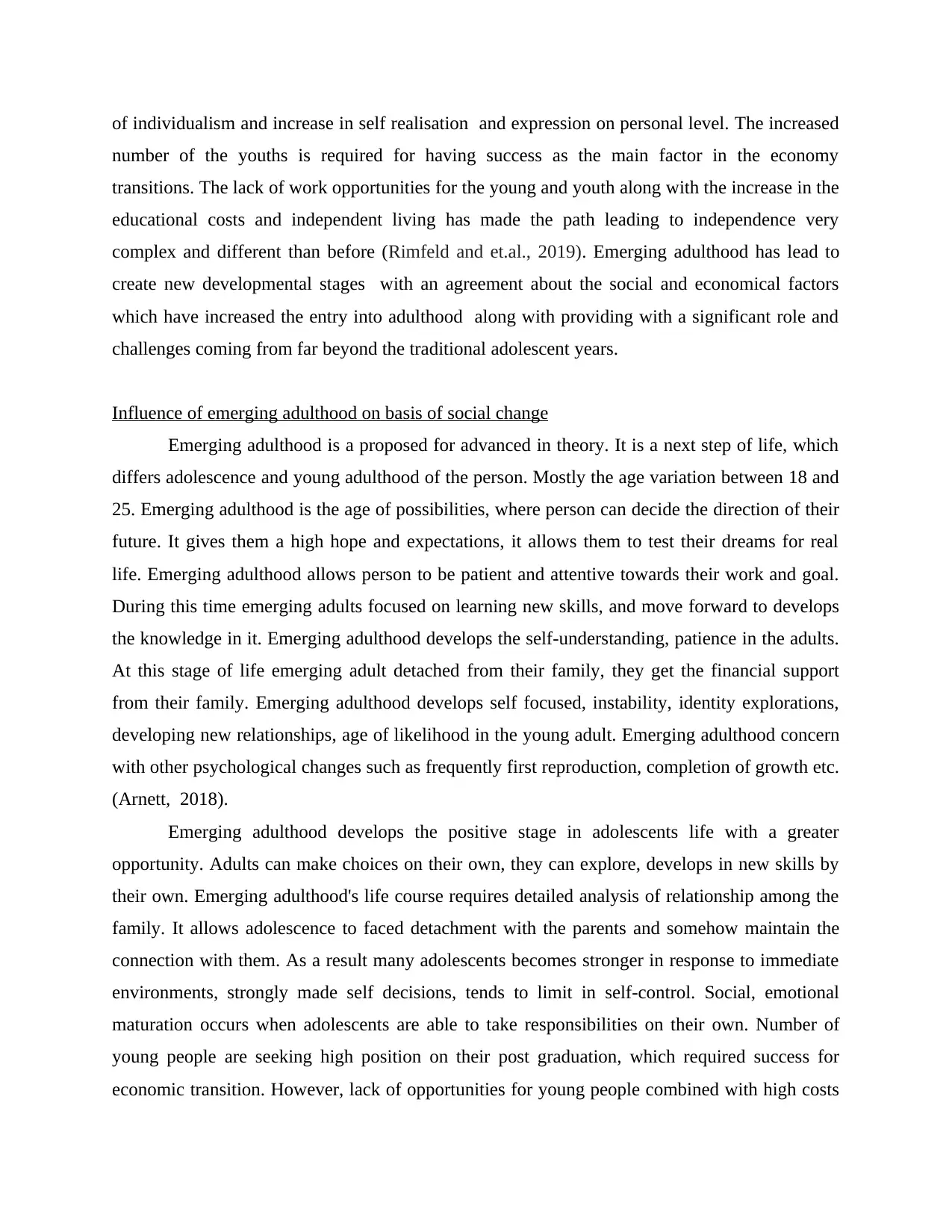
of individualism and increase in self realisation and expression on personal level. The increased
number of the youths is required for having success as the main factor in the economy
transitions. The lack of work opportunities for the young and youth along with the increase in the
educational costs and independent living has made the path leading to independence very
complex and different than before (Rimfeld and et.al., 2019). Emerging adulthood has lead to
create new developmental stages with an agreement about the social and economical factors
which have increased the entry into adulthood along with providing with a significant role and
challenges coming from far beyond the traditional adolescent years.
Influence of emerging adulthood on basis of social change
Emerging adulthood is a proposed for advanced in theory. It is a next step of life, which
differs adolescence and young adulthood of the person. Mostly the age variation between 18 and
25. Emerging adulthood is the age of possibilities, where person can decide the direction of their
future. It gives them a high hope and expectations, it allows them to test their dreams for real
life. Emerging adulthood allows person to be patient and attentive towards their work and goal.
During this time emerging adults focused on learning new skills, and move forward to develops
the knowledge in it. Emerging adulthood develops the self-understanding, patience in the adults.
At this stage of life emerging adult detached from their family, they get the financial support
from their family. Emerging adulthood develops self focused, instability, identity explorations,
developing new relationships, age of likelihood in the young adult. Emerging adulthood concern
with other psychological changes such as frequently first reproduction, completion of growth etc.
(Arnett, 2018).
Emerging adulthood develops the positive stage in adolescents life with a greater
opportunity. Adults can make choices on their own, they can explore, develops in new skills by
their own. Emerging adulthood's life course requires detailed analysis of relationship among the
family. It allows adolescence to faced detachment with the parents and somehow maintain the
connection with them. As a result many adolescents becomes stronger in response to immediate
environments, strongly made self decisions, tends to limit in self-control. Social, emotional
maturation occurs when adolescents are able to take responsibilities on their own. Number of
young people are seeking high position on their post graduation, which required success for
economic transition. However, lack of opportunities for young people combined with high costs
number of the youths is required for having success as the main factor in the economy
transitions. The lack of work opportunities for the young and youth along with the increase in the
educational costs and independent living has made the path leading to independence very
complex and different than before (Rimfeld and et.al., 2019). Emerging adulthood has lead to
create new developmental stages with an agreement about the social and economical factors
which have increased the entry into adulthood along with providing with a significant role and
challenges coming from far beyond the traditional adolescent years.
Influence of emerging adulthood on basis of social change
Emerging adulthood is a proposed for advanced in theory. It is a next step of life, which
differs adolescence and young adulthood of the person. Mostly the age variation between 18 and
25. Emerging adulthood is the age of possibilities, where person can decide the direction of their
future. It gives them a high hope and expectations, it allows them to test their dreams for real
life. Emerging adulthood allows person to be patient and attentive towards their work and goal.
During this time emerging adults focused on learning new skills, and move forward to develops
the knowledge in it. Emerging adulthood develops the self-understanding, patience in the adults.
At this stage of life emerging adult detached from their family, they get the financial support
from their family. Emerging adulthood develops self focused, instability, identity explorations,
developing new relationships, age of likelihood in the young adult. Emerging adulthood concern
with other psychological changes such as frequently first reproduction, completion of growth etc.
(Arnett, 2018).
Emerging adulthood develops the positive stage in adolescents life with a greater
opportunity. Adults can make choices on their own, they can explore, develops in new skills by
their own. Emerging adulthood's life course requires detailed analysis of relationship among the
family. It allows adolescence to faced detachment with the parents and somehow maintain the
connection with them. As a result many adolescents becomes stronger in response to immediate
environments, strongly made self decisions, tends to limit in self-control. Social, emotional
maturation occurs when adolescents are able to take responsibilities on their own. Number of
young people are seeking high position on their post graduation, which required success for
economic transition. However, lack of opportunities for young people combined with high costs
Paraphrase This Document
Need a fresh take? Get an instant paraphrase of this document with our AI Paraphraser
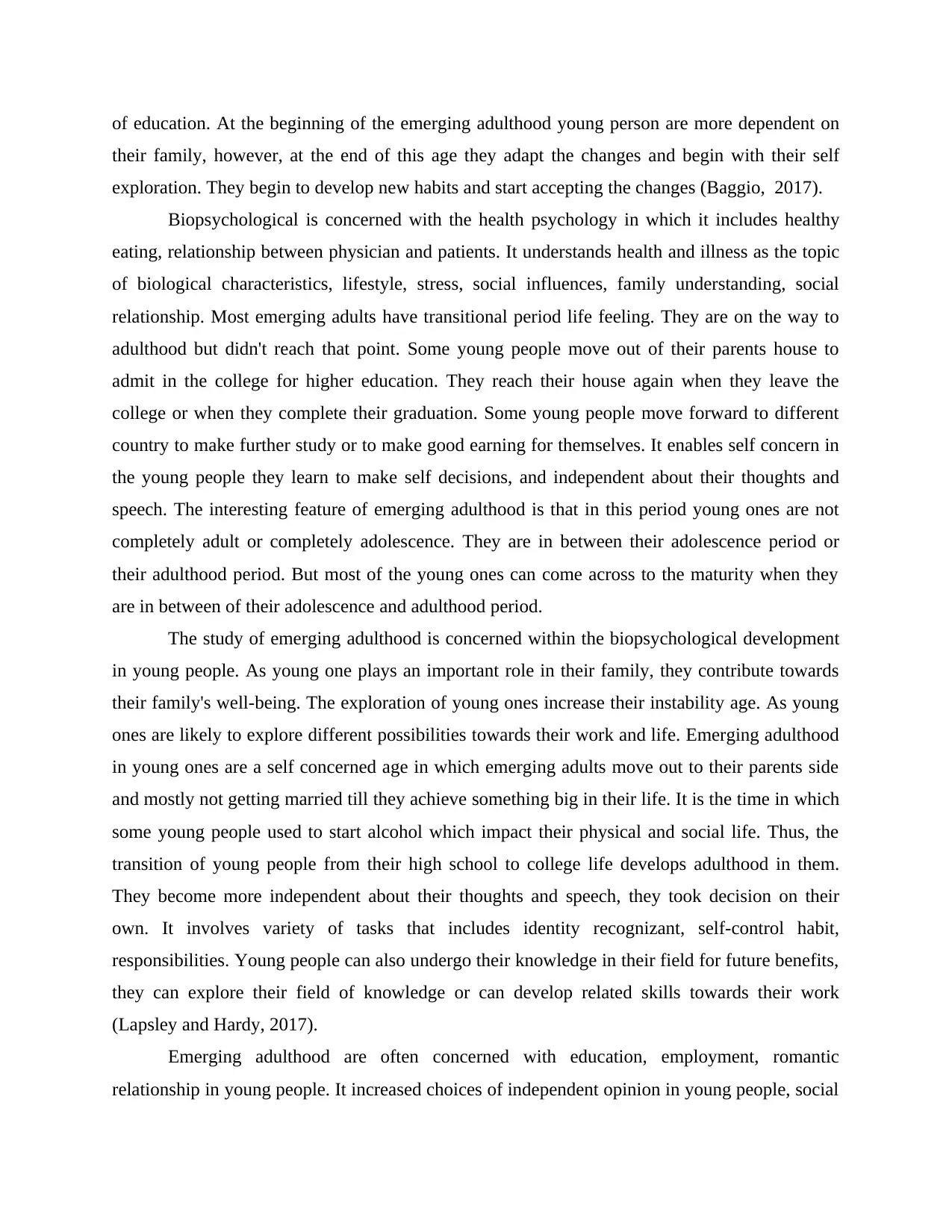
of education. At the beginning of the emerging adulthood young person are more dependent on
their family, however, at the end of this age they adapt the changes and begin with their self
exploration. They begin to develop new habits and start accepting the changes (Baggio, 2017).
Biopsychological is concerned with the health psychology in which it includes healthy
eating, relationship between physician and patients. It understands health and illness as the topic
of biological characteristics, lifestyle, stress, social influences, family understanding, social
relationship. Most emerging adults have transitional period life feeling. They are on the way to
adulthood but didn't reach that point. Some young people move out of their parents house to
admit in the college for higher education. They reach their house again when they leave the
college or when they complete their graduation. Some young people move forward to different
country to make further study or to make good earning for themselves. It enables self concern in
the young people they learn to make self decisions, and independent about their thoughts and
speech. The interesting feature of emerging adulthood is that in this period young ones are not
completely adult or completely adolescence. They are in between their adolescence period or
their adulthood period. But most of the young ones can come across to the maturity when they
are in between of their adolescence and adulthood period.
The study of emerging adulthood is concerned within the biopsychological development
in young people. As young one plays an important role in their family, they contribute towards
their family's well-being. The exploration of young ones increase their instability age. As young
ones are likely to explore different possibilities towards their work and life. Emerging adulthood
in young ones are a self concerned age in which emerging adults move out to their parents side
and mostly not getting married till they achieve something big in their life. It is the time in which
some young people used to start alcohol which impact their physical and social life. Thus, the
transition of young people from their high school to college life develops adulthood in them.
They become more independent about their thoughts and speech, they took decision on their
own. It involves variety of tasks that includes identity recognizant, self-control habit,
responsibilities. Young people can also undergo their knowledge in their field for future benefits,
they can explore their field of knowledge or can develop related skills towards their work
(Lapsley and Hardy, 2017).
Emerging adulthood are often concerned with education, employment, romantic
relationship in young people. It increased choices of independent opinion in young people, social
their family, however, at the end of this age they adapt the changes and begin with their self
exploration. They begin to develop new habits and start accepting the changes (Baggio, 2017).
Biopsychological is concerned with the health psychology in which it includes healthy
eating, relationship between physician and patients. It understands health and illness as the topic
of biological characteristics, lifestyle, stress, social influences, family understanding, social
relationship. Most emerging adults have transitional period life feeling. They are on the way to
adulthood but didn't reach that point. Some young people move out of their parents house to
admit in the college for higher education. They reach their house again when they leave the
college or when they complete their graduation. Some young people move forward to different
country to make further study or to make good earning for themselves. It enables self concern in
the young people they learn to make self decisions, and independent about their thoughts and
speech. The interesting feature of emerging adulthood is that in this period young ones are not
completely adult or completely adolescence. They are in between their adolescence period or
their adulthood period. But most of the young ones can come across to the maturity when they
are in between of their adolescence and adulthood period.
The study of emerging adulthood is concerned within the biopsychological development
in young people. As young one plays an important role in their family, they contribute towards
their family's well-being. The exploration of young ones increase their instability age. As young
ones are likely to explore different possibilities towards their work and life. Emerging adulthood
in young ones are a self concerned age in which emerging adults move out to their parents side
and mostly not getting married till they achieve something big in their life. It is the time in which
some young people used to start alcohol which impact their physical and social life. Thus, the
transition of young people from their high school to college life develops adulthood in them.
They become more independent about their thoughts and speech, they took decision on their
own. It involves variety of tasks that includes identity recognizant, self-control habit,
responsibilities. Young people can also undergo their knowledge in their field for future benefits,
they can explore their field of knowledge or can develop related skills towards their work
(Lapsley and Hardy, 2017).
Emerging adulthood are often concerned with education, employment, romantic
relationship in young people. It increased choices of independent opinion in young people, social
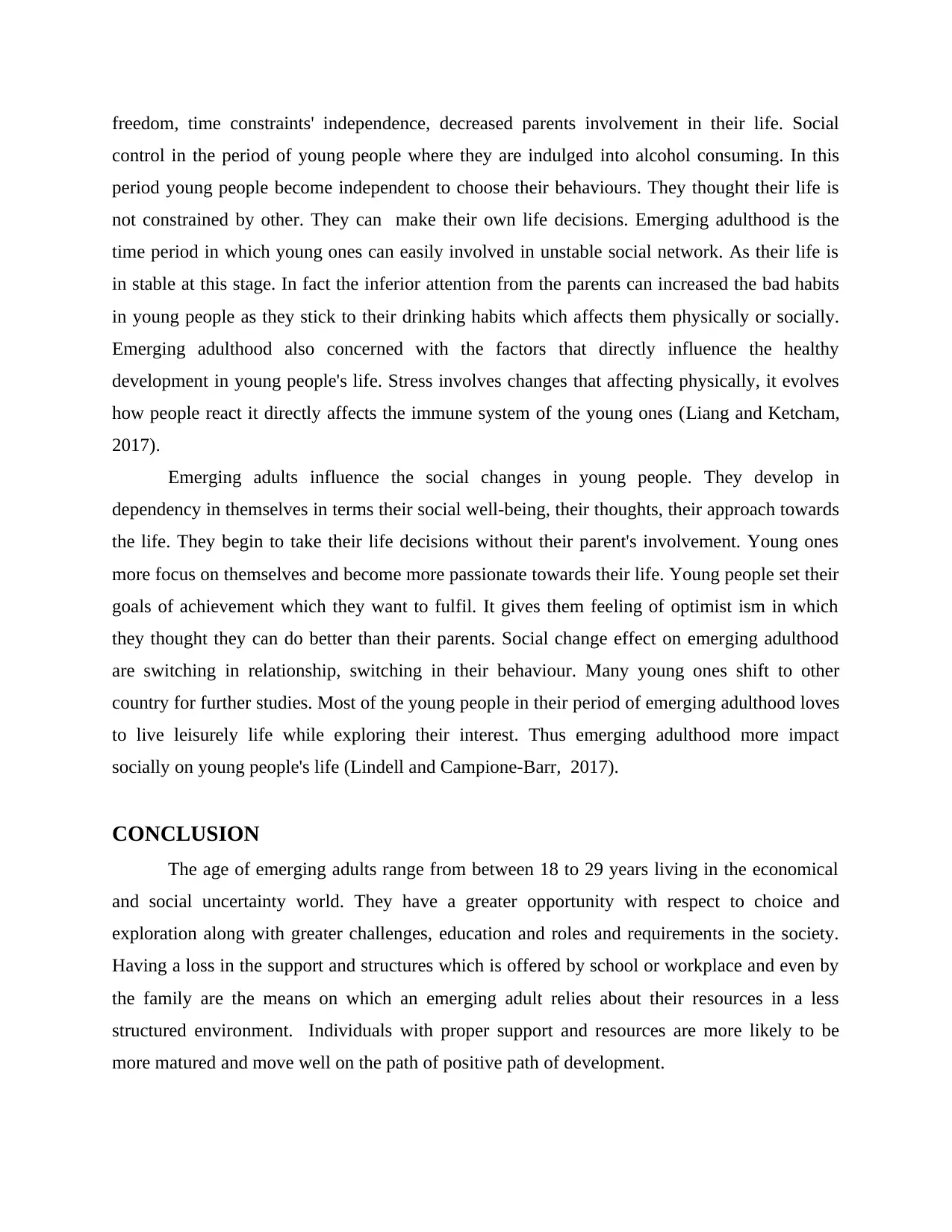
freedom, time constraints' independence, decreased parents involvement in their life. Social
control in the period of young people where they are indulged into alcohol consuming. In this
period young people become independent to choose their behaviours. They thought their life is
not constrained by other. They can make their own life decisions. Emerging adulthood is the
time period in which young ones can easily involved in unstable social network. As their life is
in stable at this stage. In fact the inferior attention from the parents can increased the bad habits
in young people as they stick to their drinking habits which affects them physically or socially.
Emerging adulthood also concerned with the factors that directly influence the healthy
development in young people's life. Stress involves changes that affecting physically, it evolves
how people react it directly affects the immune system of the young ones (Liang and Ketcham,
2017).
Emerging adults influence the social changes in young people. They develop in
dependency in themselves in terms their social well-being, their thoughts, their approach towards
the life. They begin to take their life decisions without their parent's involvement. Young ones
more focus on themselves and become more passionate towards their life. Young people set their
goals of achievement which they want to fulfil. It gives them feeling of optimist ism in which
they thought they can do better than their parents. Social change effect on emerging adulthood
are switching in relationship, switching in their behaviour. Many young ones shift to other
country for further studies. Most of the young people in their period of emerging adulthood loves
to live leisurely life while exploring their interest. Thus emerging adulthood more impact
socially on young people's life (Lindell and Campione-Barr, 2017).
CONCLUSION
The age of emerging adults range from between 18 to 29 years living in the economical
and social uncertainty world. They have a greater opportunity with respect to choice and
exploration along with greater challenges, education and roles and requirements in the society.
Having a loss in the support and structures which is offered by school or workplace and even by
the family are the means on which an emerging adult relies about their resources in a less
structured environment. Individuals with proper support and resources are more likely to be
more matured and move well on the path of positive path of development.
control in the period of young people where they are indulged into alcohol consuming. In this
period young people become independent to choose their behaviours. They thought their life is
not constrained by other. They can make their own life decisions. Emerging adulthood is the
time period in which young ones can easily involved in unstable social network. As their life is
in stable at this stage. In fact the inferior attention from the parents can increased the bad habits
in young people as they stick to their drinking habits which affects them physically or socially.
Emerging adulthood also concerned with the factors that directly influence the healthy
development in young people's life. Stress involves changes that affecting physically, it evolves
how people react it directly affects the immune system of the young ones (Liang and Ketcham,
2017).
Emerging adults influence the social changes in young people. They develop in
dependency in themselves in terms their social well-being, their thoughts, their approach towards
the life. They begin to take their life decisions without their parent's involvement. Young ones
more focus on themselves and become more passionate towards their life. Young people set their
goals of achievement which they want to fulfil. It gives them feeling of optimist ism in which
they thought they can do better than their parents. Social change effect on emerging adulthood
are switching in relationship, switching in their behaviour. Many young ones shift to other
country for further studies. Most of the young people in their period of emerging adulthood loves
to live leisurely life while exploring their interest. Thus emerging adulthood more impact
socially on young people's life (Lindell and Campione-Barr, 2017).
CONCLUSION
The age of emerging adults range from between 18 to 29 years living in the economical
and social uncertainty world. They have a greater opportunity with respect to choice and
exploration along with greater challenges, education and roles and requirements in the society.
Having a loss in the support and structures which is offered by school or workplace and even by
the family are the means on which an emerging adult relies about their resources in a less
structured environment. Individuals with proper support and resources are more likely to be
more matured and move well on the path of positive path of development.
⊘ This is a preview!⊘
Do you want full access?
Subscribe today to unlock all pages.

Trusted by 1+ million students worldwide
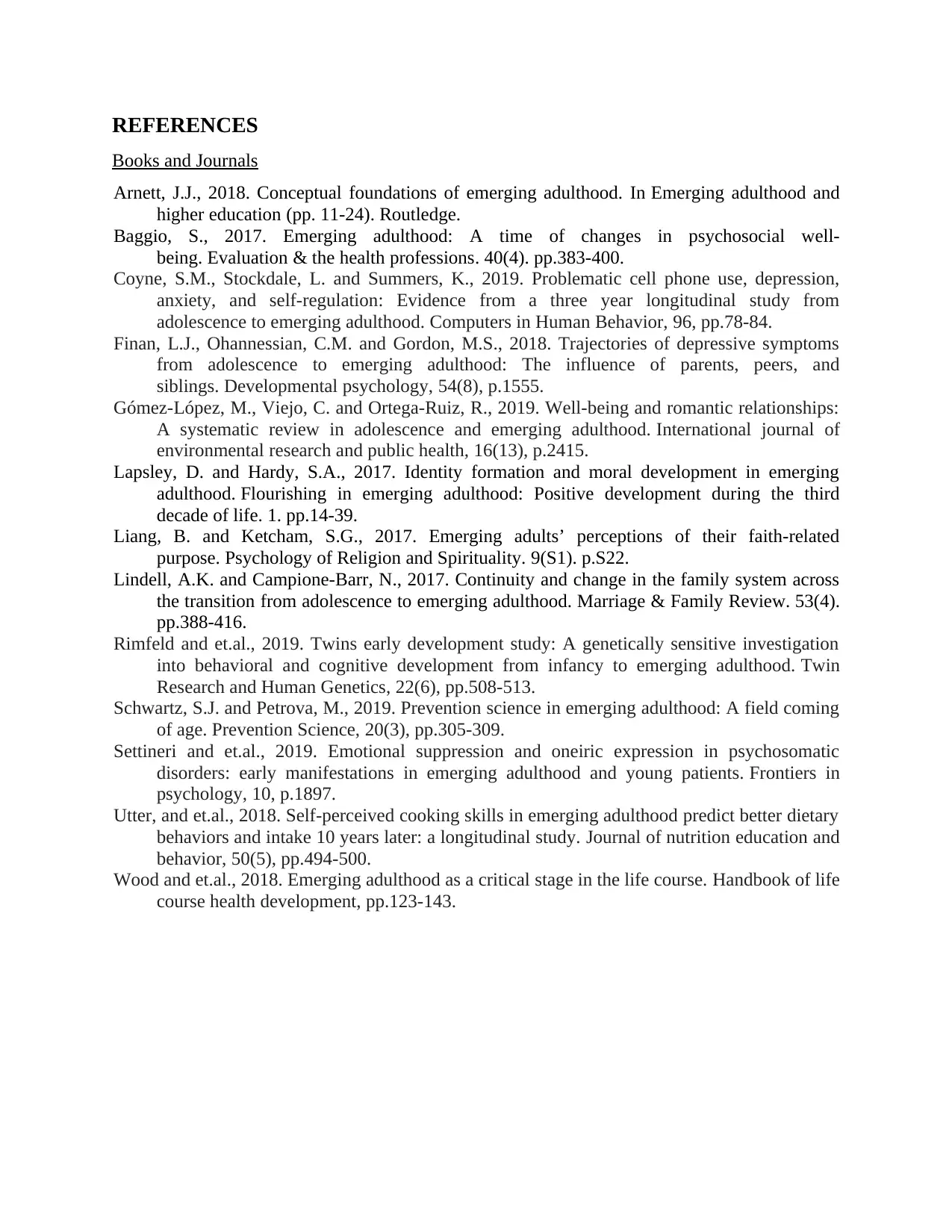
REFERENCES
Books and Journals
Arnett, J.J., 2018. Conceptual foundations of emerging adulthood. In Emerging adulthood and
higher education (pp. 11-24). Routledge.
Baggio, S., 2017. Emerging adulthood: A time of changes in psychosocial well-
being. Evaluation & the health professions. 40(4). pp.383-400.
Coyne, S.M., Stockdale, L. and Summers, K., 2019. Problematic cell phone use, depression,
anxiety, and self-regulation: Evidence from a three year longitudinal study from
adolescence to emerging adulthood. Computers in Human Behavior, 96, pp.78-84.
Finan, L.J., Ohannessian, C.M. and Gordon, M.S., 2018. Trajectories of depressive symptoms
from adolescence to emerging adulthood: The influence of parents, peers, and
siblings. Developmental psychology, 54(8), p.1555.
Gómez-López, M., Viejo, C. and Ortega-Ruiz, R., 2019. Well-being and romantic relationships:
A systematic review in adolescence and emerging adulthood. International journal of
environmental research and public health, 16(13), p.2415.
Lapsley, D. and Hardy, S.A., 2017. Identity formation and moral development in emerging
adulthood. Flourishing in emerging adulthood: Positive development during the third
decade of life. 1. pp.14-39.
Liang, B. and Ketcham, S.G., 2017. Emerging adults’ perceptions of their faith-related
purpose. Psychology of Religion and Spirituality. 9(S1). p.S22.
Lindell, A.K. and Campione-Barr, N., 2017. Continuity and change in the family system across
the transition from adolescence to emerging adulthood. Marriage & Family Review. 53(4).
pp.388-416.
Rimfeld and et.al., 2019. Twins early development study: A genetically sensitive investigation
into behavioral and cognitive development from infancy to emerging adulthood. Twin
Research and Human Genetics, 22(6), pp.508-513.
Schwartz, S.J. and Petrova, M., 2019. Prevention science in emerging adulthood: A field coming
of age. Prevention Science, 20(3), pp.305-309.
Settineri and et.al., 2019. Emotional suppression and oneiric expression in psychosomatic
disorders: early manifestations in emerging adulthood and young patients. Frontiers in
psychology, 10, p.1897.
Utter, and et.al., 2018. Self-perceived cooking skills in emerging adulthood predict better dietary
behaviors and intake 10 years later: a longitudinal study. Journal of nutrition education and
behavior, 50(5), pp.494-500.
Wood and et.al., 2018. Emerging adulthood as a critical stage in the life course. Handbook of life
course health development, pp.123-143.
Books and Journals
Arnett, J.J., 2018. Conceptual foundations of emerging adulthood. In Emerging adulthood and
higher education (pp. 11-24). Routledge.
Baggio, S., 2017. Emerging adulthood: A time of changes in psychosocial well-
being. Evaluation & the health professions. 40(4). pp.383-400.
Coyne, S.M., Stockdale, L. and Summers, K., 2019. Problematic cell phone use, depression,
anxiety, and self-regulation: Evidence from a three year longitudinal study from
adolescence to emerging adulthood. Computers in Human Behavior, 96, pp.78-84.
Finan, L.J., Ohannessian, C.M. and Gordon, M.S., 2018. Trajectories of depressive symptoms
from adolescence to emerging adulthood: The influence of parents, peers, and
siblings. Developmental psychology, 54(8), p.1555.
Gómez-López, M., Viejo, C. and Ortega-Ruiz, R., 2019. Well-being and romantic relationships:
A systematic review in adolescence and emerging adulthood. International journal of
environmental research and public health, 16(13), p.2415.
Lapsley, D. and Hardy, S.A., 2017. Identity formation and moral development in emerging
adulthood. Flourishing in emerging adulthood: Positive development during the third
decade of life. 1. pp.14-39.
Liang, B. and Ketcham, S.G., 2017. Emerging adults’ perceptions of their faith-related
purpose. Psychology of Religion and Spirituality. 9(S1). p.S22.
Lindell, A.K. and Campione-Barr, N., 2017. Continuity and change in the family system across
the transition from adolescence to emerging adulthood. Marriage & Family Review. 53(4).
pp.388-416.
Rimfeld and et.al., 2019. Twins early development study: A genetically sensitive investigation
into behavioral and cognitive development from infancy to emerging adulthood. Twin
Research and Human Genetics, 22(6), pp.508-513.
Schwartz, S.J. and Petrova, M., 2019. Prevention science in emerging adulthood: A field coming
of age. Prevention Science, 20(3), pp.305-309.
Settineri and et.al., 2019. Emotional suppression and oneiric expression in psychosomatic
disorders: early manifestations in emerging adulthood and young patients. Frontiers in
psychology, 10, p.1897.
Utter, and et.al., 2018. Self-perceived cooking skills in emerging adulthood predict better dietary
behaviors and intake 10 years later: a longitudinal study. Journal of nutrition education and
behavior, 50(5), pp.494-500.
Wood and et.al., 2018. Emerging adulthood as a critical stage in the life course. Handbook of life
course health development, pp.123-143.
Paraphrase This Document
Need a fresh take? Get an instant paraphrase of this document with our AI Paraphraser

1 out of 11
Related Documents
Your All-in-One AI-Powered Toolkit for Academic Success.
+13062052269
info@desklib.com
Available 24*7 on WhatsApp / Email
![[object Object]](/_next/static/media/star-bottom.7253800d.svg)
Unlock your academic potential
Copyright © 2020–2026 A2Z Services. All Rights Reserved. Developed and managed by ZUCOL.





